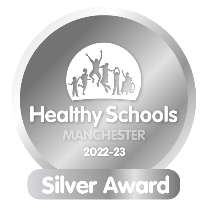Crumpsall Lane Primary School
- Home
-
School Information
- Behaviour
- British Values
- Data Protection
- Equality
- End of Key Stage Outcomes
- Extra-Curricular Activities
- Financial Information
- Our Ofsted Reports
- PE and Sports Premium
- Personal Development
- Policies
- Pupil Premium
- Remote Learning
- Safeguarding
- Self-Evaluation Summary and School Improvement Priorities
- SEND and Inclusion
- National Nurturing Schools Programme
- Our Staff
-
Our Curriculum
- Our Parents
- Our Twitter Feed
Our Personal, Social, Health Education (PSHE) curriculum at Crumpsall Lane aims to provide children with the knowledge and skills that will enable them to keep themselves happy, healthy and safe, as well as prepare them for life in the wider world.
At Crumpsall Lane we work with Manchester Healthy Schools. Manchester Healthy Schools have provided us with a comprehensive range of resources that have been developed and approved by the Manchester Local Care Organisation. Our partnership with Manchester Health Schools enables us to greater support the development of our pupils in subject areas outside of the academic curriculum. The aim of our curriculum is to tackle health inequalities and improve the health and wellbeing of the children and young people in our care.
Our curriculum is organised into 6 units.
Unit 1 – Mental and Emotional Health
Unit 2 – Living in the Wider World
Unit 3 – Healthy Lifestyles
Unit 4 – Keeping Safe
Unit 5 – Relationships and Sex Education (RSE)
Unit 6 – Preparing for Transition
More detailed information about what we teach in each unit can be found in our PSHE Curriculum Overview.
At Crumpsall Lane we work with Manchester Healthy Schools. Manchester Healthy Schools have provided us with a comprehensive range of resources that have been developed and approved by the Manchester Local Care Organisation. Our partnership with Manchester Health Schools enables us to greater support the development of our pupils in subject areas outside of the academic curriculum. The aim of our curriculum is to tackle health inequalities and improve the health and wellbeing of the children and young people in our care.
Our curriculum is organised into 6 units.
Unit 1 – Mental and Emotional Health
Unit 2 – Living in the Wider World
Unit 3 – Healthy Lifestyles
Unit 4 – Keeping Safe
Unit 5 – Relationships and Sex Education (RSE)
Unit 6 – Preparing for Transition
More detailed information about what we teach in each unit can be found in our PSHE Curriculum Overview.
Please visit our 'Relationship and Sex Education' (RSE) page for more information about this statutory part of the curriculum.
Page Last Reviewed: 02.05.2024
Contact Us:
Address: Crumpsall Lane, Manchester, M8 5SR
Telephone number: 0161 740 3741
Email address: [email protected] (Mrs. Hayes, Office Manager)
Please contact Mrs. Hayes in our school office if you have any queries. If she is unavailable, other members of our office team will be able to assist you.
All material on our website is available as a paper copy.
Telephone number: 0161 740 3741
Email address: [email protected] (Mrs. Hayes, Office Manager)
Please contact Mrs. Hayes in our school office if you have any queries. If she is unavailable, other members of our office team will be able to assist you.
All material on our website is available as a paper copy.
- Home
-
School Information
- Behaviour
- British Values
- Data Protection
- Equality
- End of Key Stage Outcomes
- Extra-Curricular Activities
- Financial Information
- Our Ofsted Reports
- PE and Sports Premium
- Personal Development
- Policies
- Pupil Premium
- Remote Learning
- Safeguarding
- Self-Evaluation Summary and School Improvement Priorities
- SEND and Inclusion
- National Nurturing Schools Programme
- Our Staff
-
Our Curriculum
- Our Parents
- Our Twitter Feed
